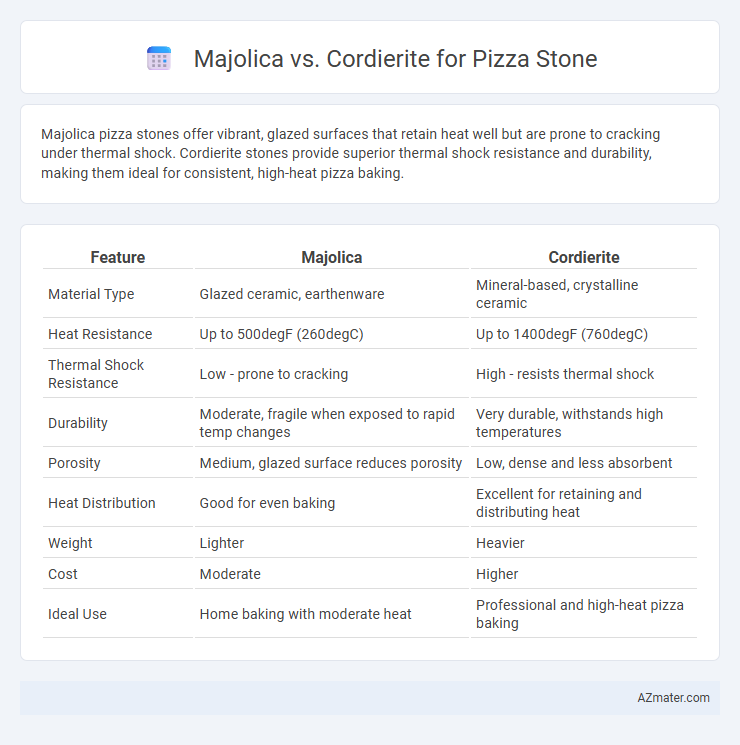Majolica pizza stones offer vibrant, glazed surfaces that retain heat well but are prone to cracking under thermal shock. Cordierite stones provide superior thermal shock resistance and durability, making them ideal for consistent, high-heat pizza baking.
Table of Comparison
| Feature | Majolica | Cordierite |
|---|---|---|
| Material Type | Glazed ceramic, earthenware | Mineral-based, crystalline ceramic |
| Heat Resistance | Up to 500degF (260degC) | Up to 1400degF (760degC) |
| Thermal Shock Resistance | Low - prone to cracking | High - resists thermal shock |
| Durability | Moderate, fragile when exposed to rapid temp changes | Very durable, withstands high temperatures |
| Porosity | Medium, glazed surface reduces porosity | Low, dense and less absorbent |
| Heat Distribution | Good for even baking | Excellent for retaining and distributing heat |
| Weight | Lighter | Heavier |
| Cost | Moderate | Higher |
| Ideal Use | Home baking with moderate heat | Professional and high-heat pizza baking |
Introduction: Choosing the Right Pizza Stone Material
Selecting the ideal pizza stone material directly affects heat retention and baking quality. Majolica, a ceramic known for its vibrant glaze and smooth surface, offers quick heat absorption but can be prone to cracking under extreme temperature changes. Cordierite provides superior thermal shock resistance and even heat distribution, ensuring consistent, crispy pizza crusts without the risk of breaking.
What is Majolica? An Overview
Majolica is a type of glazed ceramic known for its colorful, decorative surface and porous body, commonly used in pottery and tile-making. Unlike cordierite, which is a dense, heat-resistant mineral ideal for pizza stones due to its durability and thermal shock resistance, majolica offers less thermal stability but excels in aesthetic appeal. Majolica pizza stones may provide even heat distribution but require careful handling to prevent cracking and are better suited for low to medium heat applications.
What is Cordierite? An Overview
Cordierite is a mineral-based ceramic popular for pizza stones due to its exceptional thermal shock resistance and even heat distribution, which allows it to withstand rapid temperature changes without cracking. Unlike Majolica, which is a glazed earthenware often more decorative than functional, Cordierite is specifically designed for high-heat cooking environments, providing durability and optimal baking performance. Its porous surface absorbs moisture, resulting in a crispier pizza crust and more consistent cooking results.
Heat Retention and Distribution: Majolica vs Cordierite
Cordierite pizza stones offer superior heat retention and even heat distribution, making them ideal for consistently crispy crusts by maintaining stable cooking temperatures. Majolica, known for its decorative glazed surface, tends to have lower heat retention and may heat unevenly, which can result in inconsistent baking results. Cordierite's thermal shock resistance also ensures durability during rapid temperature changes, unlike Majolica, which is more prone to cracking under high heat fluctuations.
Durability and Lifespan Comparison
Majolica pizza stones offer good heat retention but are more prone to cracking due to their ceramic composition, resulting in a shorter lifespan compared to cordierite stones. Cordierite is renowned for its exceptional durability, thermal shock resistance, and ability to withstand high temperatures without warping or breaking, making it a preferred choice for long-term use. Cordierite stones typically last significantly longer than majolica, maintaining performance and structural integrity through thousands of heating cycles.
Baking Performance: Crust Quality and Texture
Majolica pizza stones offer excellent heat retention, producing evenly cooked crusts with a slight crispness and chewy interior due to their dense, glazed ceramic surface. Cordierite stones excel in thermal shock resistance and maintain steady heat distribution, resulting in a perfectly crisp crust with a slightly more porous texture that absorbs moisture efficiently. Both materials enhance crust quality, but Cordierite tends to create a crunchier exterior, while Majolica provides a balanced crisp-chewy texture ideal for artisanal pizzas.
Maintenance and Cleaning Differences
Majolica pizza stones require gentle cleaning with a soft brush or sponge to avoid damaging their glazed surface, and they should never be soaked in water to prevent cracking. Cordierite stones, known for their durability and thermal shock resistance, can be scrubbed more aggressively and are dishwasher safe, making maintenance simpler and more straightforward. Cordierite's porous nature allows it to absorb oils and food residues over time, requiring periodic deep cleaning or seasoning, whereas Majolica's non-porous glaze resists stains and odors more effectively.
Price and Availability of Majolica and Cordierite Stones
Majolica pizza stones typically present a higher price point compared to cordierite due to their handcrafted ceramic nature and limited production. Cordierite stones are widely available and more affordable, benefiting from mass manufacturing and high thermal shock resistance. Price sensitivity and ease of purchase often make cordierite the preferred choice for everyday use and commercial settings.
Pros and Cons: Majolica vs Cordierite
Majolica pizza stones offer excellent heat retention and beautiful, colorful glazing that resists cracking, making them ideal for even baking and aesthetic appeal, but they tend to be heavier and more fragile compared to other materials. Cordierite pizza stones provide superior thermal shock resistance, preventing cracks during rapid temperature changes, and they are more durable and lightweight, yet they may lack the vibrant finish and heat distribution uniformity of majolica. Choosing between majolica and cordierite depends on balancing visual appeal and heat retention against durability and resistance to thermal stress in pizza baking.
Which Pizza Stone is Best for Your Needs?
Majolica pizza stones offer excellent heat retention and a smooth surface that prevents dough from sticking, making them ideal for home bakers seeking consistent crust texture. Cordierite pizza stones boast superior thermal shock resistance and durability, perfect for frequent use and high-temperature cooking without cracking. Choose a Majolica stone for even heat distribution in moderate oven use, while Cordierite suits heavy-duty cooking and outdoor pizza ovens.

Infographic: Majolica vs Cordierite for Pizza Stone
 azmater.com
azmater.com